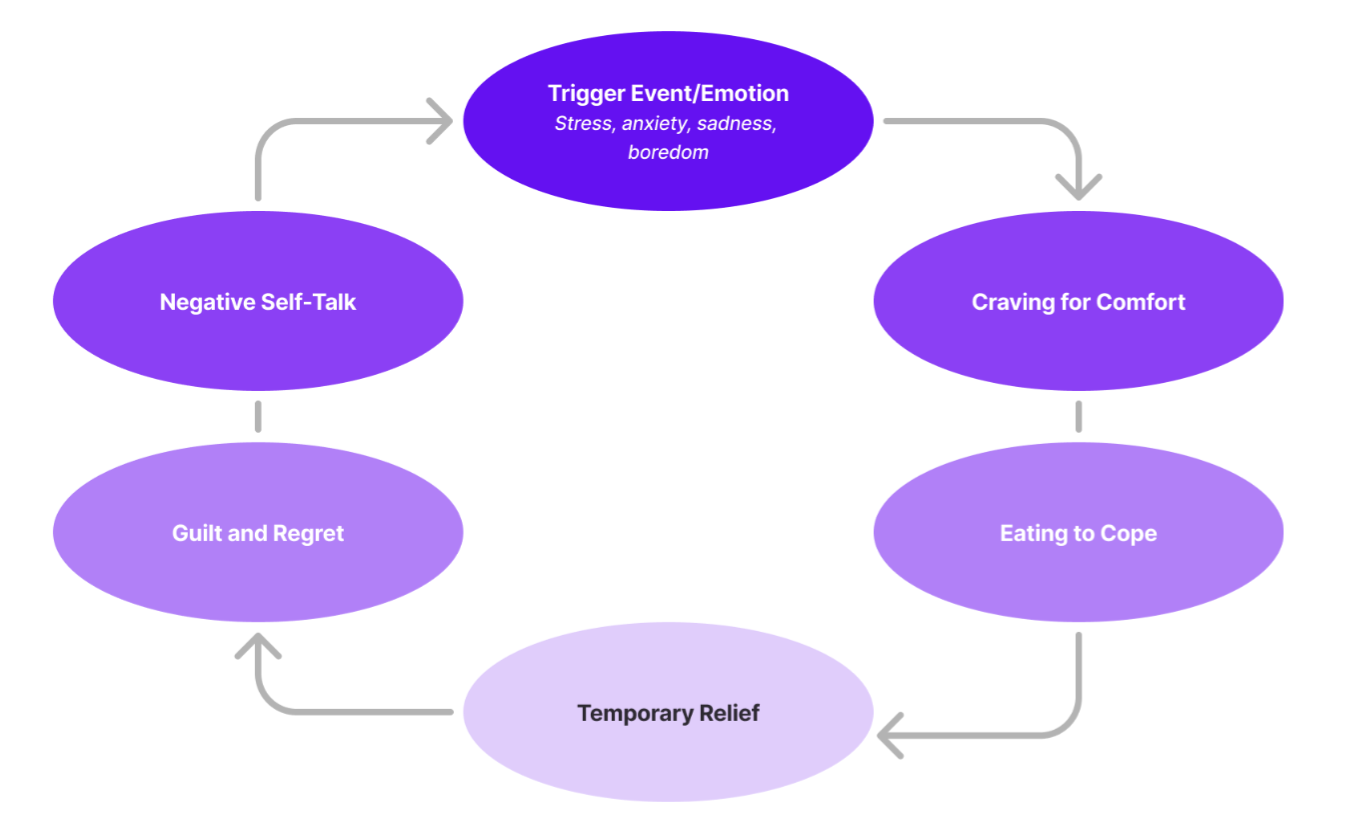Imagine sitting alone in your kitchen after a long day. You’re overwhelmed, stressed, frustrated.
You reach for the tub of ice cream, thinking, “just one scoop” (although deep down you know it won’t be, and don’t care because it’s been a day).
Suddenly, the spoon scrapes the bottom. What?! Guilt, shame, and negative self-talk flood in.
Those situations can feel so deflating! We’ve all been there.
Emotional eating is not a weakness, and stopping itis not about willpower.
The key is developing self-awareness and self-compassion.
When we recognize what’s going on, we can make better choices without judgment. The cycle is essentially:

Let’s get into the science…
Emotional eating is often driven by stress, sadness, or boredom, and it’s a way for the brain to seek comfort. However, it is also possible to over-consume food when we feel joy! So what the heck does science say about emotional eating?
To summarize a few recent studies, here is what we know about emotional eating:
Impact of stress and emotion:
Emotional eating is significantly influenced by negative emotions (e.g., stress, anxiety, depression), which lead to unhealthy eating behaviors, particularly among individuals with abdominal obesity, who are less likely to adopt healthy dietary patterns.
Physiological responses:
Emotional eaters tend to have higher cortisol levels and reduced brain activation in reward-processing when anticipating food, suggesting they may overeat during stress to compensate for decreased reward response, reinforcing maladaptive eating habits.
Dietary patterns and nutritional deficits:
Emotional eaters tend to consume more hyperpalatable, energy-dense foods, resulting in lower intakes of essential nutrients (e.g., fiber, vitamins) and higher intakes of unhealthy fats and sodium, particularly in those with abdominal obesity.
Need for multidisciplinary interventions:
Effective strategies for managing emotional eating should incorporate stress reduction techniques, potential cognitive behavioral therapy, and nutrition education to improve health outcomes and quality of life, alongside calls for further research on the emotional-food relationship. This is because emotional eating self-assessments can be flawed.
In a nutshell: Emotional eating is linked to overweight/obesity and unhealthy dietary patterns, with evidence suggesting that negative psychological states, such as depression and anxiety, increase the likelihood of overeating and the consumption of unhealthy foods. Navigating emotional regulation and more nutrition knowledge/education are recommended strategies to support reducing emotional eating.
THE “do before food” list
Instead of immediately reaching for food to address emotions, try doing 3–5 small tasks first. These tasks help break the automatic response to eat and give you time to reflect. Here are a few ideas:
- Get the mail
- Spend 5 minutes outside / listen to a favorite song
- Unload the dishwasher
- Drink a glass of water
- Send a text to a friend
If you still feel like eating after completing these, give yourself permission to do so—guilt-free!
3 ways to manage emotional eating
1. Give Yourself Permission
Emotional eating doesn’t have to be a secret shame. When you make the decision with full awareness, it becomes a conscious choice, not a moment of weakness. Use it as a learning experience and reflect on what’s happening. Understand your triggers, and if the food really resolved what you were looking for.
2. Be Intentional with Food
Assess how truly hungry you are before eating on a scale of 1–10 (10 being ravenous). Do a brief scan and observe any emotions that may be coming up. Eat slowly, mindfully, and put your utensil down between bites. Slow your pace of eating, and chew your food to a paste. Take a break every 5 minutes and check back in with that hunger scale of 1–10.
3. Have Self-Compassion
Be kind to yourself. Who among us has turned to food for comfort at some point? It’s okay! No one will die. The key is acknowledging what you’re doing without negative self-talk. Mindfulness is about recognizing your thoughts and feelings without judgment.
Ready to start thriving again? Let us help by putting an expert in your corner to get you there faster and maintain that progress for life! Learn more about our online health coaching by clicking here!
RESOURCES:
Harvard Brain Institute – Emotional Eating
PubMed: Emotional Eating & Obesity
PubMed: Cortisol & Eating Behavior
PMC: Emotional Eating & Health Interventions


.jpg)